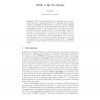1369 search results - page 91 / 274 » Lattice computations for random numbers |
FOCS
2007
IEEE
14 years 3 months ago
2007
IEEE
In STOC’05, Ahn, Hopper and Langford introduced the notion of covert computation. A covert computation protocol is one in which parties can run a protocol without knowing if oth...
WAW
2004
Springer
14 years 2 months ago
2004
Springer
d Abstract) Paolo Boldi† Massimo Santini‡ Sebastiano Vigna∗ Deciding which kind of visit accumulates high-quality pages more quickly is one of the most often debated issue i...
BMCBI
2007
13 years 9 months ago
2007
Background: We investigate the empirical complexity of the RNA secondary structure design problem, that is, the scaling of the typical difficulty of the design task for various cl...
IACR
2011
12 years 8 months ago
2011
KISS (‘Keep it Simple Stupid’) is an efficient pseudo-random number generator originally specified by G. Marsaglia and A. Zaman in 1993. G. Marsaglia in 1998 posted a C versio...
CORR
2010
Springer
13 years 7 months ago
2010
Springer
A protocol for computing a functionality is secure if an adversary in this protocol cannot cause more harm than in an ideal computation where parties give their inputs to a truste...

